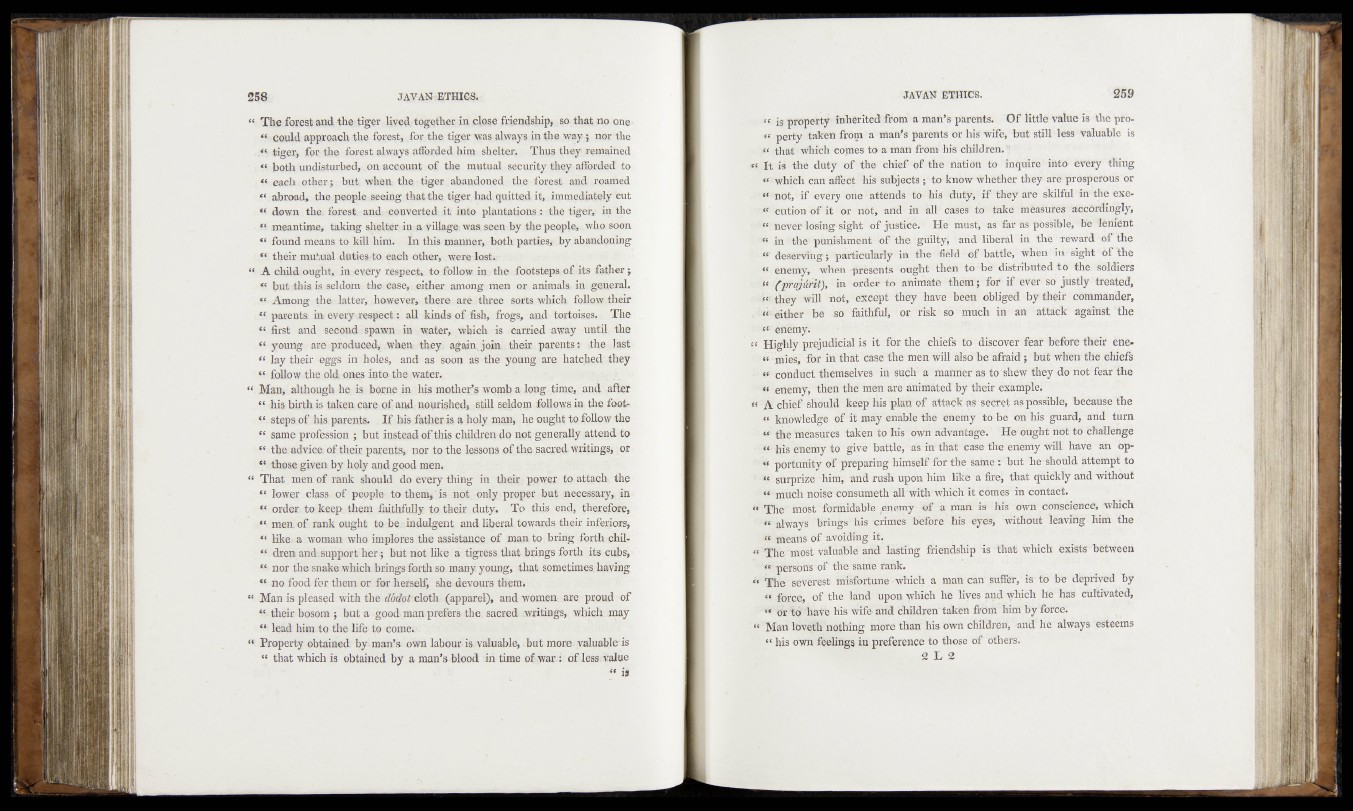
“ The forest-and Zestiger lived,-togetherin> .close friendship, so that no one?
“ could approach the fogest*. Jbprtho tiger'v?as, always ih the way; nor the
rigee, foe the forisfe always afforded hire, shelter,. Thus they remained
“ both undisturbed, on account of the mutual; security they afforded to
« each other», but when the tiger abandoned the forest and roamed
■ abroad, the. people se^Pg. that the tiger had quitted it, immediately cut
« down the, forest, and couvertedvit into plantations: the tigers in the
- .f‘ meantime, taking dtetor in Ärvillaget was/seen by the people, ^ho s®®n
“ found means to kill him. ' Li this zander, both parties» by abandoning
“ their mutual duties-to each other, were .lost..
“ A child ought, in e why respect* to-ffihowirbthe footstalk of fits father ;
“ but this, is seldom- the Case, either among men or animals in general.
« Among. the, • latter, however, there are three sorts which folios® their
“ parents in every respect: all kinds of fish, frogs» and tortoises. The
“ first and second I spawn in water, which is ; carried away until, the
**■ young are produaed^ when theyi again. joilh. their parents ? thé--test
“ lay their eggs in holes, and as soon as the young are hatebed dhey
(Sj follow the_okjli ones ipto-tho water.
“ Man, although he is borne in his mother’s womb a long time, an4 after
his birth is taken care.of and nourished, still seldom follows, in the foot».
*‘~stepabf bin parents. I f hisffatheris.a-holy man, be ought to fcdlffiW the
“ same profession ; but instead of this children, do npt gpnegajly .attend, to
“ the. ad vice) of their preuts» nor tp the lessons of the sacred, writings, or
“ those given- by holy andgood men.
“ That men of rank should do every thing in their power tp. attach, the
H lower class o f people- to them, ' is not, only proper but. necessary*, in
“ order, to keep, them fidthfuHy to. their duty, Tb-this end, therefore,
« menuf. rank «sight to hen indulgent and liberal, towards their in&gio®s»
“ like a woman who implores the assistance of man to bring Äithschil-
“ dren and-.support her; but not like a tigress that brings forth its-cubs,
nor thesnakejwhich brings forth so many young, that sometimes: having
“ no food for then* or for herself, she, devours th qm.
“ Man is pleased with the cloth (apparel), and women: are proud of
“ their bosom ; but a good man. prefers the, sacred writings,, which may
“ lead: him .to the. life to comet-
Property obtained by manïs own labour- is valuable, but more valuable-is
“ that which is obtained by a man’s blood in time of war: ofless-Value
** is
tt ig property Inherited from a man’s parents. Of little value is the pro-
« petty takfeh ftfom a ffîaft^S parents orhlawife', ■ but still’less Valuable is
g that ' Which comes to a-man from his children. ^
It is the duty of'ithe-fctóef hf the natiött tb i Squire into every thing
“*Whièh eSn affect; his subjects ;'to know Whether tbèy-athprosperötis or
*ti!ftbt, I if •' eVéïy‘-ôïîe ^attends ■ tó f his -dii'ty-,: if rthby àrè j skilfùl in ‘the hxe-
xj cutkmfof it W)r mót, arid in hlk câséW in ta k e mèastóéf''aëcMÖirigly,
“(neveriosing'sghî^èf -jhstiéé. ^ He mdsf,‘-’as far af pbsifime] :Efe férixént
m |a -the-' punishment foFthe Jgdtftyi *%n'à: liberal' in the ’-reward ,Jô f the
«*• deserving ; particularly in When ‘in- eight è f the
as enemy, when ’presents ought then to *foê' ‘ distributed1 -to thej^sbldiers
ft rpfajûrit), ' in order to animate them’; for i f fofêFW jiiStly1 treated,
««•they will not, except they’have been obliged by* their commander,
:“4*éitber be so faithful, or. ‘risk' so Tiiüch iri an attack’ ’against, The
»“• enemy.
Highly prejudicial is it for the chiefs teffdiscover’ fear before their ène-
iV -'mies, for in that café the men Will also» he afraid ; but When1 the Chiefs
«^conduct themselves- in frich1 a manner âs to'shéw they db'fiof feâr the
iss- erieriiy, then the mén are animated by their example.'
•’À qhfdf should keep hispktn of attack aS’séOrei àâ possible, because the
tt knowledge o f ft may eriabie the ’enemy ti3 be eta his* guard, and turn
« the-toeasutes taken to his own advantage.1 ^He-ought hot to challefige
his enemy to give battle, as in f fiât case the'eridany will have ah bp-
« portunity of preparing himself for the same: blit-h h should attempt to
surprize him, and rush upon him like a fiffe^ that quickly and without
** much noisemotfsumeth ’all with1 which it comes in eoiltaet.
The” most formidable ^enemy M a' man ‘is’-ftia Own conscience, Which
■^ always brings his-crimesTîéfpre his éyés; withdrit leaving him the
A limans of avoiding it.
The moét val^lbie and lasting fkendship is that which exists between
'^’■persons o f the;satrte rank.
%hrè 'severest tnisfortune which a man can Sïdför, is'fb' be üêpïfved by
** force, of the land upon whi'ch hê lives and which he has cultivated,
w er t d bavé his wife and children'taken from him' by foréei
Man löveïh nothing More than his own children, and he always esteems
“ his own feelings im preference to those of others'.
2 L 2